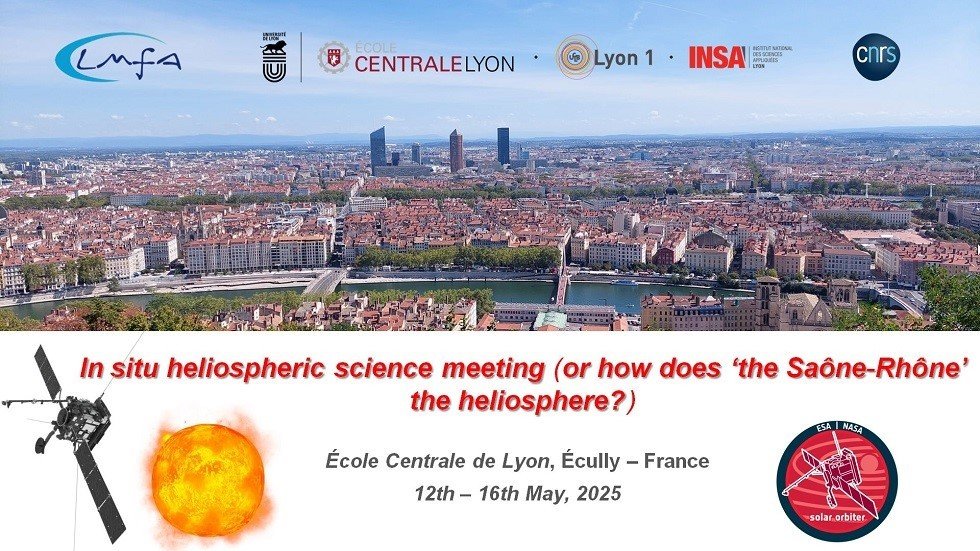SIG35 and SIG50 Workshop
Workshop website: https://helio-insitu.sciencesconf.org/
Organizing Committee Members:
- Raffaele Marino – Laboratoire de Mécanique des Fluides et d'Acoustique – CNRS, École Centrale de Lyon (FR)
- Emmanuel Lévêque – Laboratoire de Mécanique des Fluides et d'Acoustique – CNRS, École Centrale de Lyon (FR)
- Chris Owen – Mullard Space Science Laboratory, University College of London (UK)
- Daniel Verscharen – Mullard Space Science Laboratory, University College of London (UK)
- Tim Horbury – Space and Atmospheric Physics, Blackett Laboratory, Imperial College London (UK)
- Roberto Bruno – Italian National Institute for Astrophysics (IT)
- Raffaella D'Amicis – Italian National Institute for Astrophysics (IT)
- Milan Maksimovic – Laboratoire d'études spatiales et d'instrumentation en astrophysique, Université Paris Sciences et Lettres (FR)
- Matthieu Kretzschmar – Laboratoire de Physique et Chimie de l’Environnement et de l’Espace, Université d'Orléans (FR)
- Javier Rodríguez-Pacheco – Departamento Física y Matemáticas, University of Alcalá (ES)
- Vincent Génot – Institut de Recherche en Astrophysique et Planétologie (FR)
Aims:
Sharing with community the most recent investigations on turbulence and nonlinear dynamics in space plasmas. The event will gather scientists and engineers conducting research on mathematical and numerical turbulence modeling, plasma experiments and the observations made by the most recent space plasma missions, in particular – but not limited to – by the “Solar Orbiter” (SolO) spacecraft.
Funded by the European Space Agency with the contribution of NASA SolO was launched in February 2020 and has entered its nominal production phase at the end of 2021, allowing already a great deal on breakthrough discoveries on turbulence and nonlinear dynamics in fields related to heliospheric, solar and fundamental plasmas.
The helilosphere is indeed pervaded by a natural plasma of solar origin (the “solar wind”) that blows away from the Sun’s corona at very high speed (~ 300-900 km/s) and temperature (~104-105K). This environment provides unique opportunities to investigate the dynamics of highly turbulent non-collisional plasmas that expand without experiencing confinement, thus in conditions not achievable in the laboratory.
The scientific organizing committee (SOC) of this workshop includes members of the local Lyon - Saint-Étienne academic community in France, as well as world recognized scientists of the team that designed and developed the “solar wind analyzer” (SWA) on board of SolO. Together with other physical quantities and high-order statistics, SWA measures the velocity of protons, electrons and ion species of the turbulent solar wind like a probe in a gigantic natural wind tunnel, where the flow that blows is actually the supersonic and superf-Alfvénic plasma ejected by the Sun. The plasma science stemming from the firsts SolO observations has already contributed to advance our understanding of fundamental plasma turbulence and waves dynamics, as well as the developing of instabilities and dissipation mechanisms characterizing space and laboratory plasma frameworks. The 99% of the visible universe is made of plasma, while hot and cold plasmas are operated every day in research, industrial and public facilities, with state of the art plasma technologies being already at the base of modern fusion reactors, aerospace engineering, navigation and communication infrastructures. Advancing fundamental research on plasmas is therefore critical to support the development of sectors that are strategic at national and international level and to underpin the many technological applications based on these frameworks. France has currently a leading role in the construction of the world's largest magnetic confinement plasma physics experiment, the International Thermonuclear Experimental Reactor (ITER), a tokamak nuclear fusion reactor that is being built in Saint-Paul-lès-Durance. Major French national agencies, such as the CNES and the CNRS, are also involved in a number space mission for the investigation of nonlinear dynamics in space plasmas and the development of models to predict the effects of its coupling with the Earth’s magnetosphere (including SolO), the so called “space weather”.
The Université de Lyon with some of its institutional partners – the Laboratoire de Mécanique des Fluides et d'Acoustique (CNRS, École Centrale de Lyon, Univ. Lyon1, Insa de Lyon) and the Centre de Recherche Astrophys. de Lyon (CNRS, Univ. Lyon1, Ens de Lyon), in particular – has the ambition to become one of the national poles for the research on plasma turbulence and play a major role in the international plasma community.
It is in this context that the SIG50 plans to organize a workshop in Lyon that follows two previous successful initiatives around these topics held at ECL, proposing major contributions on various turbulence research streams carried on by the broad ERCOFTAC community, fostering new collaborations among European institutions and supporting activities and careers of its junior members.
I) 2019: Turbulence and instabilities in plasmas – https://plasma-flows.sciencesconf.org/
II) 2023: Turbulent energy transfer in space plasmas – https://turb-space.sciencesconf.org/
This scientific output of this event will reach also in terms of the possibility to share among ERCOFTAC members and make public space plasma turbulent data samples, magnetohydrodynamic plasma test case simulations produce with state-of-art pseudo-spectral and lattice-Boltzmann numerical codes.

